Alexander 2.18
Alexander the Great (*356; r. 336-323): the Macedonian king who defeated his Persian colleague Darius III Codomannus and conquered the Achaemenid Empire. During his campaigns, Alexander visited a.o. Egypt, Babylonia, Persis, Media, Bactria, the Punjab, and the valley of the Indus. In the second half of his reign, he had to find a way to rule his newly conquered countries. Therefore, he made Babylon his capital and introduced the oriental court ceremonial, which caused great tensions with his Macedonian and Greek officers.
The fourth beast
Cultural contact
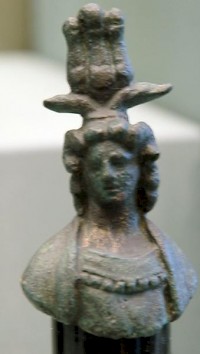
Men make their own history, but they do not make it just as they please; they do not make it under circumstances chosen by themselves, but under circumstances inherited from the past. It is tempting to see Alexander as an exception to this rule, to think that he was the brilliant conqueror who forged his own fate. This temptation should at all costs be resisted. Alexander was not the man who overthrew the Achaemenid Empire, he was merely a harvester.
In the century before his reign, the satraps of the western half of the Achaemenid Empire had adapted themselves to the Greek culture of which Alexander was an exponent too. At the same time, the Macedonians had been pupils of the Persians. Many aspects of Macedonian society are best understood as imitations of Persian customs. East and west had already started to resemble each other; Alexander was nothing more and nothing less than the man who united two cultures that would have been united anyway.
This does not mean that Alexander was a mere puppet on a string. How the two cultures were united was very much of Alexander's choosing and responsibility. The decisive moment was the aftermath of the battle of Issus, when he refused to accept Darius' peace offer and proclaimed himself king of Asia. Until then, he had been the liberator of the Greek towns in Asia, from now on, his aims were higher: he became a conqueror. What had been a defensive action, changed into an offensive. It is no accident that Alexander treated the tomb of Cyrus the Great, the founder of the Achaemenid empire, with respect. The legendary Persian king had been a conqueror too.
The destroyer
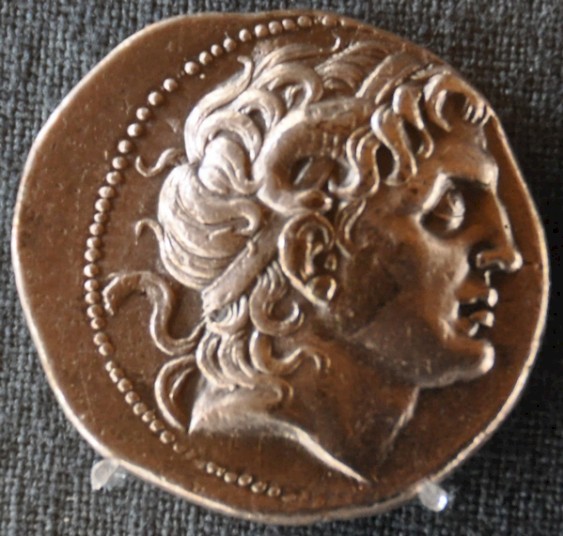
Conquerors are by definition destroyers. Alexander ruined his own country, draining its human resources: after his reign, Macedonia never regained its former power. The Persian culture suffered severe blows, too. The destruction of Persepolis served no real military purpose. In Zoroastrian texts, Alexander is called "the accursed", because many people were killed and the religious traditions were in great peril. (It is interesting to note that the ram's horns that are shown on Alexander's coins, became an attribute of the Persian god of evil, Ahriman. Later, they were to influence the western iconography of the devil.) It is true, Alexander could show clemency towards Persians and used them as satraps and soldiers (we will return to this point); but he was harsh towards people that were of no military value.
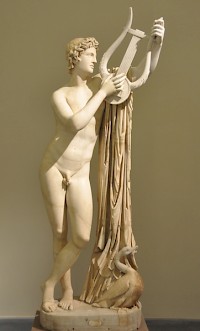
Alexander's biographer Aristobulus introduced the idea that Alexander was driven by pothos, "longing". He wanted to go beyond everything done before, and was thirsting for wisdom. This last aspect of Alexander's psychology - the desire for knowledge - is certainly incorrect. To make just three basic observations:
- the charming story about his meeting with the Brahmans cannot be found in the "good" historiographic tradition; Arrian of Nicomedia introduces the story with "they say", which is always an indication that he did not find it in his best sources, Ptolemy and Aristobulus.
- the Macedonians and Greeks never understood such basic things as the difference between the Magians and the Chaldaeans (the first were Persian religious specialists, the second were Babylonian astronomers).
- Alexander never learned Persian or Aramaic.
One of his contemporaries, Demetrius of Phaleron, a Greek philosopher who was like Alexander a pupil of Aristotle of Stagira, was especially impressed by the destruction of Persia (text). This is remarkable, because as an Aristotelian, he would have been aware of Alexander's quest for wisdom, if wisdom was really what the Macedonian king was longing for.
This leaves us with Alexander as a conqueror, as the man who chose violence to unite what was bound to unite. The author of the Biblical book Daniel expressed this when he portrayed Alexander as the fourth of a series of apocalyptic animals, exceedingly strong beast with ten horns and iron teeth, which devoured, broke in pieces and stamped the world (text).
The spread of Greek culture
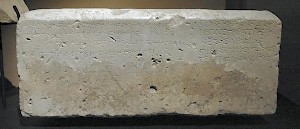
This can, however, not be the last word. Conquest had cultural consequences. Although the Macedonians did the fighting, the Greeks were the beneficiaries of Alexander's campaigns. Their culture spread over the Near East. For example, archaeologists have excavated a town in northeastern Afghanistan (Ai Khanum) that was in nearly all its aspects Greek. On one of its temple walls, one could read the wisdom maxims from the oracle of Delphi.
Antioch and Alexandria succeeded Babylon as the world's cultural capital. Unlike Athens, Sparta, Corinth, and Thebes, these cities were cosmopolitan. A Greek from Antioch or Alexandria could meet people from other cultures. The famous Alexandrian library contained translations of the Jewish Bible, ancient Egyptian texts and Babylonian scientific publications.
The Greeks became increasingly aware of the achievements of other civilizations. That would have happened anyway, but Alexander speeded up the process. This was recognized by Eratosthenes of Cyrene (one of the Alexandrine librarians), who wrote that the most important result of Alexander's conquest was that the old, clear-cut distinction between good Greeks and evil barbarians had been challenged (text).
Interpretations
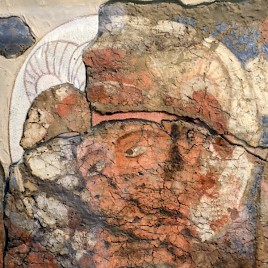
The fact that Eratosthenes had to write this down, proves that his idea was not self-evident, and indeed, most Greeks had a different view. To them, Alexander had not opened their eyes to the civilizations of the ancient Near East, but had changed the nature of savage tribes. For example, Plutarch of Chaeronea believed that Alexander had been the greatest civilizer in world history and praises his hero for every virtue he can think of (text).
This image of Alexander as the philosopher-king who civilized the savage Babylonians, Egyptians and Persians has been very influential in Antiquity and the Renaissance. The idea can also be found in the rabbinical treatise Genesis Rabbah, where we can read a story about Alexander visiting the king of the legendary country Kasiah, because he wants to know how he administers the public interest (text).
Eratosthenes' idea was revived by the great German historian Gustav Droysen (1808-1884), who argued in his Geschichte Alexanders des Grossen (1833) that the Macedonian king wanted to unify mankind. He called it Alexander's Verschmelzungspolitik ("policy of fusion" is a poor translation). One of the most important arguments for this idea is the story about the marriages in Susa, where Macedonians and Persians were forced to marry (text). Droysen found an epigone in W.W. Tarn, who assumed that Alexander believed in "the unity of mankind" and wanted to create one large world empire.
Tarn's best known publication is Alexander the Great (1948), but his ideas were essentially from before the Second World war; the two volumes of his magnum opus do not contain insights that were not already present in his chapter in the 1927 edition of the Cambridge Ancient History. After 1939-1945, the idea that war could be waged for the benefit of mankind, was considered naive. Benito Mussolini, Adolf Hitler, and Joseph Stalin had started to influence the study of Alexander.
Changing views on war and leadership were not the only development that changed the study of Alexander. The two volumes of Helmut Berve's Das Alexanderreich auf prosopographischer Grundlage (1926) offered the first systematic overview of the careers of all officers and officials of Alexander's empire, and enabled scholars to see patterns in his appointment policy. Another important publication was R. Andreotti's Il problema politico di Alessandro Magno (1933), which showed how much of Alexander's policy could be explained from military needs. Ideology was not necessary as explanation of his behavior.
Ernst Badian depicted the conqueror as a megalomaniac, paranoid autocrat and a ruthless killer. In his very specialized, closely reasoned and extremely important article "Alexander and the unity of mankind" (in Historia 7, 1958), he destroys the reputation of both Alexander and Tarn. One of his arguments is the "reign of terror" after the march through the Gedrosian desert: Alexander ordered the arrest and execution of several satraps (text).
(It may be noted that this view has an ancient antecedent in the work of Cleitarchus, who described the Macedonian king as corrupted by his constant good fortune and turning into a cruel, paranoid alcoholic. This interpretation was at least as popular as Plutarch's opposite view. The Roman philosopher Seneca could present Alexander as the type of someone who had become arrogant due to flattery.)
The Australian historian Brian Bosworth, today's leading contemporary scholar on the subject, usually dismisses Badian's psychological interpretation of Alexander (e.g., in Conquest and Empire, 1988). On most other aspects, however, he agrees with him. Sometimes, he seems carried away by his abhorrence of violence. The comparison he makes between the genocide in India and Cortéz's war against the Aztecs, is not just a historical study, but looks like a pamphlet against imperialism (Alexander in the East, 1996).
A more moderate historian, R.D. Milns, has argued that ideas like the kinship of mankind have to attributed to ancient philosophers, not to Alexander (Alexander the Great, 1968). The absence of idealism, however, does not mean that Alexander had no Verschmelzungspolitik. This is not a return to Droysen, however. In his view, fusion was Alexander's ultimate goal. Modern scholars see the Verschmelzungspolitik as the tool of a conqueror. He was not interested in Persian culture as such, but needed the Persians and was therefore forced to accept them as partners. We may call this a "pragmatic policy of fusion".